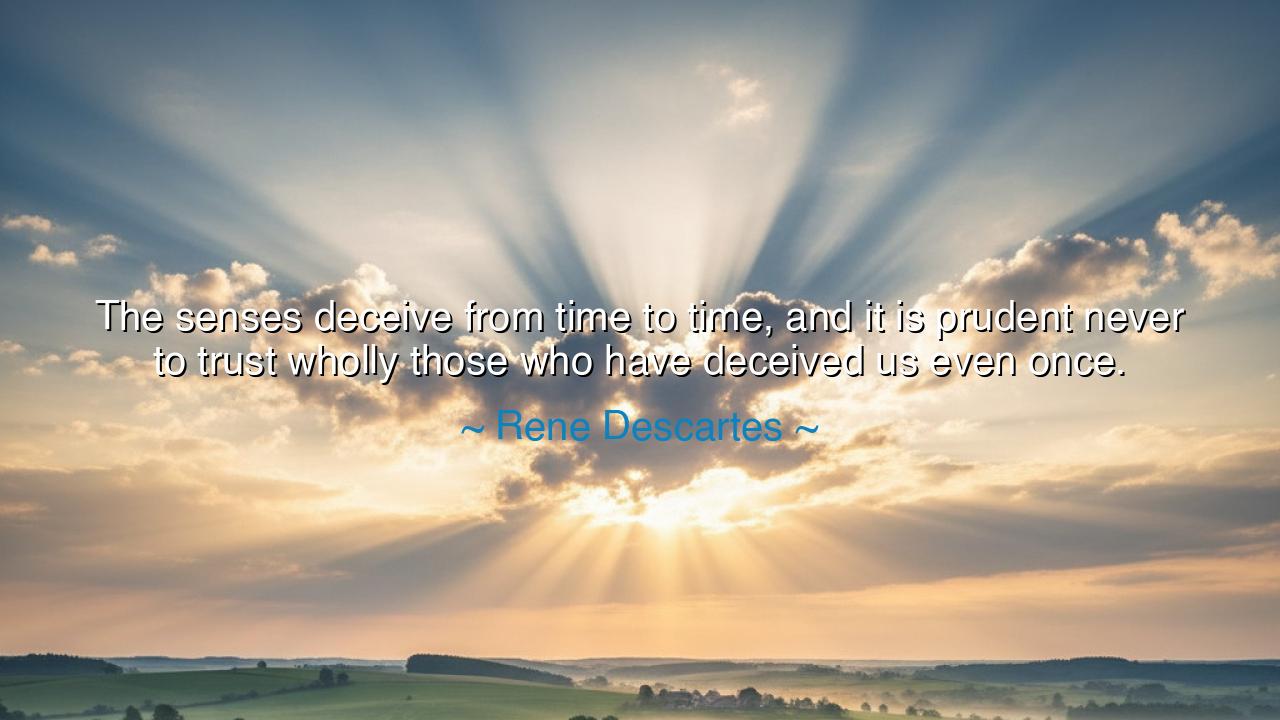
The senses deceive from time to time, and it is prudent never to
The senses deceive from time to time, and it is prudent never to trust wholly those who have deceived us even once.






Hear the voice of René Descartes, the seeker of certainty, who declared: “The senses deceive from time to time, and it is prudent never to trust wholly those who have deceived us even once.” These words cut like a blade into the heart of human perception. For though the eyes show us the world, they may show it falsely. Though the ears carry sound, they may carry lies. Though touch, taste, and smell assure us of reality, they too may falter. Descartes reminds us that wisdom lies not in blind trust, but in questioning—even questioning the very senses that seem most immediate to us.
The ancients knew of this frailty. Plato, in his allegory of the cave, described men chained in darkness, watching shadows cast upon a wall, believing them to be reality. Their senses told them the shadows were truth, but only when one prisoner broke free did he see that reality was greater than what the eyes first revealed. Descartes’ words echo this lesson: the senses can mislead, and once deceived, we must guard against trusting them as final judges of truth.
Consider the tale of sailors upon the endless sea. Many times, they saw land upon the horizon—yet it was only a mirage, the trick of light on water. If they had placed all their hope in their eyes, they would have perished, chasing illusions. But the wise mariner learned to use instruments, to study the stars, to confirm with reason what the eyes could not be trusted to hold. Thus, survival belonged not to those who trusted blindly, but to those who balanced sense with judgment.
Descartes himself, in his great quest for certainty, doubted everything he could. He realized that the senses, though often reliable, had deceived him before. And if they deceived once, why could they not deceive again? He sought a foundation beyond them, a truth not dependent on sight or sound but on reason itself. From this came his great affirmation: Cogito, ergo sum—“I think, therefore I am.” He built knowledge not on fragile senses, but on the certainty of the thinking mind.
But hear this warning, O seekers of truth: to mistrust the senses is not to despise them. They are guides, but partial guides. They may serve us faithfully in daily life, but they must never be mistaken for perfect rulers. Just as a wise king does not trust wholly the counsel of one advisor, so too the wise soul does not lean only on sight or hearing, but tests them against reason, reflection, and experience.
The lesson is plain: do not accept all things at face value. Question what you see; test what you hear; reflect upon what you feel. If once you are deceived, remember the lesson, and guard yourself from repeating it. For the world is filled with illusions—some natural, some crafted by men. To navigate it rightly is to keep the mind sharp, to let reason weigh what the senses deliver.
Practical wisdom lies before you: when making decisions, do not be swayed by appearances alone. Look deeper. Ask questions. Seek proof beyond the surface. If someone or something has deceived you once, do not grant it your blind trust again. Be cautious, but not paralyzed; skeptical, but not bitter. Balance perception with reason, and you will walk more safely through the shifting shadows of life.
Therefore, let Descartes’ words be etched in memory: “The senses deceive… and it is prudent never to trust wholly those who have deceived us even once.” Let them remind you that truth is deeper than appearance, that wisdom requires doubt, and that the mind must be captain, not slave, to the senses. In this way, you will live not as one chained to shadows, but as one who sees with the inner eye of reason.






AAdministratorAdministrator
Welcome, honored guests. Please leave a comment, we will respond soon